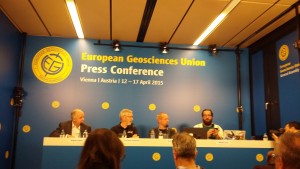Evidence for water on Mars is growing, with new research presented at the European Geosciences Union (EGU) General Assembly demonstrating novel ways we can evaluate the presence of groundwater and surface water on Mars by looking at key geomorphic features and using Earth and laboratory analogues. Also at the General Assembly, the latest results from the landing of Philae on Comet 67P//Churyumov–Gerasimenko have revealed new information about the processes involved in the formation of such masses.
It’s an exciting time for space and planetary science, which can have an important role in global development.
Space and planetary science are some of the most fascinating areas of science that rarely fail to capture the public interest. In the UK it is regularly used, alongside dinosaurs to encourage young people to engage with science and inspire them to consider careers in the STEM subjects. There is, perhaps, an innate desire to explore, to go beyond frontiers and better understand our place in the bigger picture of the solar system. The visualisation of ‘extreme scales’, such as remarkable pictures of stars and galaxies shows us things that are so radically different to the centimetres, metres and kilometres we come across on Earth.
One of the reasons people tell me they object to space and planetary research is in the context of financial resource allocation, and how we can justify expenditure on extra-terrestrial missions when there are hundreds of millions lacking access to clean water, food, education, adequate shelter and healthcare. The subject of the European Geosciences Union (EGU) General Assembly Great Debate yesterday was the ‘Thirsty 10 Billion’ – looking at the challenges of water security in a growing population. If universal access to water is going to have maximum positive impact, it must go alongside universal access to sanitation and hygiene training. It will be costly, and require individual, local, national and international commitment to investing finances in such work. How can the billions of pounds spent globally on space exploration and research be justified, in a context where hundreds of millions still lack access to a basic need such as water and a toilet?
Is a passion for international development compatible with support for projects such as those presented yesterday on Mars and the Rosetta Orbiter/Philae Lander? There are people within and working with Geology for Global Development who would answer this question in different ways. Here I offer my personal perspective, but invite you to join the discussion and share your thoughts.
1) Education and Inspiration: We’ve noted above the importance of space in engaging children (and others) with science. It’s exciting, dynamic and pioneering – and captivates interest. Many significant ‘firsts’ do – first person to fly around the world, first person to climb Everest, first group to land a probe on a comet, as the Philae team did last year! The opportunities we have through space to introduce other ideas (e.g., earth observation, remote sensing of natural hazards) are plentiful. Educating and inspiring individuals to pursue STEM subjects (science, technology, engineering and mathematics) is very important for development – technological revolutions in-country, scientific capacity and an enhanced ability to integrate science into decision making has important, positive implications. Throughout history we have seen scientists and inventors at the heart of social and economic development, and throughout the future there is no reason why this not should continue to be the case.
2) Diplomacy: Space and planetary science require international teams and international cooperation. When political tensions are high between two countries, you can often find scientists from each working together and collaborating in a constructive way. As publication and dissemination, sharing new research with as many people as possible, is so key in modern science, teams work together to achieve remarkable objectives. The international nature of the Rosetta/Philae team is an excellent example of this, and was commented upon by Karl-Heinz Glassmeier (Principal Investigator of one of the magnetometer instruments on board) as being a reason why this project has succeeded.
3) Aspiration: As space can science can inspire, it also encourages aspiration. It shows people what can be achieved when there is political unity. It gives hope. It motivates collaboration, cohesion and geodiplomacy, as noted above, through the unified pursuit of truly ambitious goals.
4) Investment in Skilled Jobs: The decision by a country to engage in space and planetary research, investing time in understanding environments beyond Earth, opens up a new branch of livelihoods and skills training. New businesses and supply chains emerge. Many of these are highly-skilled and technical positions – reinforcing the need for investment in higher education, new academic courses and new research facilities and departments. Skilled labour is another facet of many patterns of social and economic development. The money invested in space science is not spent in space, it’s spent on Earth – in materials, wages, technologies. It’s spent on research facilities (the construction and technology industries) and research studentships (strengthening higher education).
5) Research and Development: Like all science, there are areas of space science with known additional benefits to humanity and areas where we don’t know. Technologies developed may be scaled and used for many reasons and purposes. Until the work is undertaken, we just don’t know the full potential of the research.
Over the coming years we’ll hear more about plans to send new instruments to the Moon (e.g., Lunar Mission One), manned trips to Mars (where do I sign up?) and more and more ambitious projects to explore and understand our solar system and beyond. These will go in parallel with debates on water security, sustainable development, energy, climate change. The two are not in conflict, nor are they separate debates. Like almost any other discipline, with some careful thought space and planetary science can strengthen international development.
The views expressed in this piece are the personal opinion of the author, and do not necessarily represent the views of everyone at Geology for Global Development. We’d love to hear your views and welcome different opinions.

